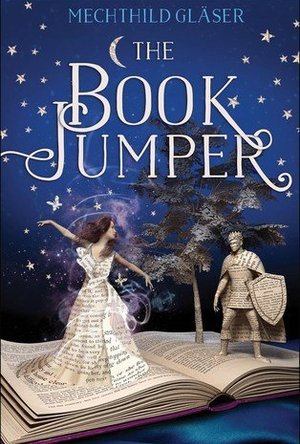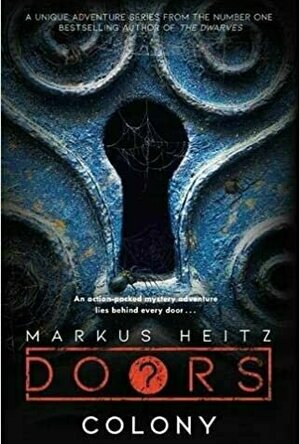Search
Search results
Tim Gunn recommended The Magic Mountain in Books (curated)
Erika (17789 KP) rated The Book Jumper in Books
Apr 29, 2018
The premise of this novel was so good, who wouldn't want to jump into a book? Though, it did give me 'Inkheart' vibes from the very beginning.
I think that's why I found this book to be just ok. Basically, the opposite of Inkheart occurs, but I think Inkheart was better written. The problem with this book might have also been the translation from German.
Book Jumpers, in this novel, protect literature, but for some reason, someone's stealing ideas. Of course, you don't really know why until the very end. It was completely predictable and I came up with a better ending in my head.
I think that's why I found this book to be just ok. Basically, the opposite of Inkheart occurs, but I think Inkheart was better written. The problem with this book might have also been the translation from German.
Book Jumpers, in this novel, protect literature, but for some reason, someone's stealing ideas. Of course, you don't really know why until the very end. It was completely predictable and I came up with a better ending in my head.
ClareR (6037 KP) rated The Seventh Cross in Books
Aug 22, 2018
This remains a lesson for us all
I was keen to read this translation, as I had originally read it during my German degree, in German. In fact, this book was a central part of my dissertation and was one of three Anna Seghers novels. They were all set in the National Socialist period of 1933-1945 (or thereabouts). I remember the German version being a very dense, challenging book - but that’s not necessarily a bad thing for me! I like a book that makes me think, and there’s plenty of food for thought here.
This story is jam packed with characters from all sides of the German story: National Socialists, Communists, the SS and the ordinary working German,
Georg Heisler (I’m using the German derivative of his name; I have no idea why his name was anglicised to ‘George’ whilst other characters kept their German names) escapes from a fictitious concentration camp (Westhofen) along with six other men. This is pre World War II, this is what the National Socialists did to their own countrymen and any dissent.
The story follows the recapture of the other six, Georg’s escape and all those who help him. Persecution on this scale is still happening today, and whether or not it is happening, we should still read about it and remember, in order to ensure that it doesn’t happen again.
I’ve touched on the language and style. It’s not easy. It wasn’t easy to read and understand in German, and it can be hard going in English. It seems quite detached from emotion, and I think this is a deliberate device. If we look at the historical context, people clearly disengaged froma large part of what was happening around them. One of the SS soldiers refers to “Sarah’s”; the men in the concentration camp are there being starved and tortured due to their political ideology, and people live within hearing distance, hear the shouting, crying and the pain of the prisoners and do nothing: an embarrassed shrug, a closing of their ears.
This is the part that we should never forget: inaction, and the necessity to stop these things in their tracks at the beginning, rather than before it’s too late.
Georg has his helpers, those who risk their lives to save his (just as Seghers and her husband, both communist Jews had their helpers). The startling thing to me about this novel, is the normalcy: the countryside stays the same, the relationships, work. All seemed normal in the face of such evil. This is a novel to remember and learn from. It has as many lessons for us today as it did seventy years ago,
This story is jam packed with characters from all sides of the German story: National Socialists, Communists, the SS and the ordinary working German,
Georg Heisler (I’m using the German derivative of his name; I have no idea why his name was anglicised to ‘George’ whilst other characters kept their German names) escapes from a fictitious concentration camp (Westhofen) along with six other men. This is pre World War II, this is what the National Socialists did to their own countrymen and any dissent.
The story follows the recapture of the other six, Georg’s escape and all those who help him. Persecution on this scale is still happening today, and whether or not it is happening, we should still read about it and remember, in order to ensure that it doesn’t happen again.
I’ve touched on the language and style. It’s not easy. It wasn’t easy to read and understand in German, and it can be hard going in English. It seems quite detached from emotion, and I think this is a deliberate device. If we look at the historical context, people clearly disengaged froma large part of what was happening around them. One of the SS soldiers refers to “Sarah’s”; the men in the concentration camp are there being starved and tortured due to their political ideology, and people live within hearing distance, hear the shouting, crying and the pain of the prisoners and do nothing: an embarrassed shrug, a closing of their ears.
This is the part that we should never forget: inaction, and the necessity to stop these things in their tracks at the beginning, rather than before it’s too late.
Georg has his helpers, those who risk their lives to save his (just as Seghers and her husband, both communist Jews had their helpers). The startling thing to me about this novel, is the normalcy: the countryside stays the same, the relationships, work. All seemed normal in the face of such evil. This is a novel to remember and learn from. It has as many lessons for us today as it did seventy years ago,
Merissa (13583 KP) rated The Kiss (The Cotiere Chronicles #1) in Books
Apr 14, 2023
I was a bit wary when starting this book as I knew from the synopsis that there were three people involved and my immediate fear was a love triangle, which I'm really fed up with reading about! However, my fears were groundless as this book took a turn that I never saw coming and by this point, I was totally engrossed in the story.
Liesl, Baden and Koen all change and grow in this book, no stagnation for any of these characters! However, Liesl is the one who grows the most. She has been lied to and manipulated for most of her life but once the truth is given to her, she makes her stand in her own quiet way, showing a strength of will and character where you might have thought of weakness. I loved her! Baden and Koen are both fantastic characters and I loved both of them. One thing I will point out in particular though, and it's about Koen. He has asthma and I LOVED that. He was not an Alpha Male absolutely perfect in every way. Instead, he has a debilitating illness (that I also suffer with so my chest tightened every time I read about his suffering!) and STILL manages to be an Alpha Male absolutely perfect in every way! He is romantic, funny, caring, protective, and loving - everything a romantic like me needs to read about.
The plot was fantastic and was very smoothly written. There is enough depth to this to make it a fantastic book and, speaking as an English transplant in Germany, I loved reading the German sentences because I understood them without the translation. Trust me, this means that it is simple enough for anyone but the translation is there just in case.
Overall, this book swept me away. Well written, edited and with no grammatical mistakes that I found, I was lost within this book and certainly didn't want it to end. Absolutely brilliant and highly recommended.
* A copy of this book was provided to me with no requirements for a review. I voluntarily read this book; the comments here are my honest opinion. *
Merissa
Archaeolibrarian - I Dig Good Books!
Jul 26, 2015
Liesl, Baden and Koen all change and grow in this book, no stagnation for any of these characters! However, Liesl is the one who grows the most. She has been lied to and manipulated for most of her life but once the truth is given to her, she makes her stand in her own quiet way, showing a strength of will and character where you might have thought of weakness. I loved her! Baden and Koen are both fantastic characters and I loved both of them. One thing I will point out in particular though, and it's about Koen. He has asthma and I LOVED that. He was not an Alpha Male absolutely perfect in every way. Instead, he has a debilitating illness (that I also suffer with so my chest tightened every time I read about his suffering!) and STILL manages to be an Alpha Male absolutely perfect in every way! He is romantic, funny, caring, protective, and loving - everything a romantic like me needs to read about.
The plot was fantastic and was very smoothly written. There is enough depth to this to make it a fantastic book and, speaking as an English transplant in Germany, I loved reading the German sentences because I understood them without the translation. Trust me, this means that it is simple enough for anyone but the translation is there just in case.
Overall, this book swept me away. Well written, edited and with no grammatical mistakes that I found, I was lost within this book and certainly didn't want it to end. Absolutely brilliant and highly recommended.
* A copy of this book was provided to me with no requirements for a review. I voluntarily read this book; the comments here are my honest opinion. *
Merissa
Archaeolibrarian - I Dig Good Books!
Jul 26, 2015
A morality tale with a glow in the dark, pink elephant....
An alcoholic, homeless man (Schoch), wakes up to see a small pink, glow in the dark elephant in his sleeping place. He puts it down to the drink, and goes back to sleep. The thing is, it's still there when he wakes up. Schoch later discovers that the small pink elephant has been genetically engineered solely to make money, and those who created it couldn't care less about it's welfare. These people want their elephant back and will do anything to get it.
This is a story about the ethical treatment of animals (and of the way that the homeless are treated and regarded), friendship, and what people will do to save the vulnerable.
I really liked all of the characters in this book: Schocha homeless man who takes on the responsibility of caring for the elephant; Kuang the elephant trainer and 'oozie' (I've never heard of this term before), the vet who gives up her house and job to care for the elephant, Roux the immoral geneticist (now he was a rather amusing character at times!).
I liked the style of this - I think that may be partly from the translation process (it was originally written in German). It was a fast, easy and very entertaining read.
Many thanks to NetGalley and the publisher for my copy of this book.
This is a story about the ethical treatment of animals (and of the way that the homeless are treated and regarded), friendship, and what people will do to save the vulnerable.
I really liked all of the characters in this book: Schocha homeless man who takes on the responsibility of caring for the elephant; Kuang the elephant trainer and 'oozie' (I've never heard of this term before), the vet who gives up her house and job to care for the elephant, Roux the immoral geneticist (now he was a rather amusing character at times!).
I liked the style of this - I think that may be partly from the translation process (it was originally written in German). It was a fast, easy and very entertaining read.
Many thanks to NetGalley and the publisher for my copy of this book.
Ross (3284 KP) rated Doors: Colony in Books
Mar 26, 2021
A slight improvement over the other book
This is another in Heitz's Doors series, three books telling the same underlying story up to a point, with a different story taking off depending on which of the mysterious doors the characters go through. In this book, the group of people employed to find and rescue rich Van Dam's daughter go through the door marked with a question mark. They find themselves in the cellar of a German bierhall in an alternative history of WWII. The war is over, the Germans having capitulated after Hitler's assassination and there is now a struggle between the Russians and the UK/USA over control of what remains.
The group find themselves slimmed down very quickly as members of the group drop like flies. Soon a small number of them find themselves in the company of some Russian spies, looking to stop the Americans' attempts to take power. For some reason, phony clairvoyant Coco Fendi now has actual powers and is capable of mind-reading, earning the respect and assistance of these spies.
There then follows a fairly enjoyable attempt to catch up with a train and board it to stop a nuclear war from breaking out.
The translation again is quite poor here, as some phrases do not make sense and make the reader work to understand what is meant. I am giving Heitz the benefit of the doubt and laying blame at the door of the translator here (though looking at some of the reviews on goodreads in German I'm not sure this is fair). However, there are some very odd passages that take the reader right out of the book, for example 'the time had come to test the 4x4's four-litre twin turbo engine promising 650 horsepower and a top speed of 190 miles an hour'. I mean, what the hell? Has Clarkson been asked to translate this book? It was completely irrelevant and odd.
In the 'Twilight' book of the series, there were some hints at other users of the doors and their purpose and provenance. This book builds on that to an extent, which is a clever idea from Heitz - in order to answer the questions, I think you need to read all three books. However, as a book in its own right, there are simply too many unanswered questions left (though slightly fewer than in 'Twilight').
An improvement, with a more coherent story once through the door in question, but still not a great read. As the first c25% is duplicated between books, I merrily skipped through this section looking for the distinct part starting off.
I received a free advance copy from the publisher and NetGalley in exchange for an honest review.
The group find themselves slimmed down very quickly as members of the group drop like flies. Soon a small number of them find themselves in the company of some Russian spies, looking to stop the Americans' attempts to take power. For some reason, phony clairvoyant Coco Fendi now has actual powers and is capable of mind-reading, earning the respect and assistance of these spies.
There then follows a fairly enjoyable attempt to catch up with a train and board it to stop a nuclear war from breaking out.
The translation again is quite poor here, as some phrases do not make sense and make the reader work to understand what is meant. I am giving Heitz the benefit of the doubt and laying blame at the door of the translator here (though looking at some of the reviews on goodreads in German I'm not sure this is fair). However, there are some very odd passages that take the reader right out of the book, for example 'the time had come to test the 4x4's four-litre twin turbo engine promising 650 horsepower and a top speed of 190 miles an hour'. I mean, what the hell? Has Clarkson been asked to translate this book? It was completely irrelevant and odd.
In the 'Twilight' book of the series, there were some hints at other users of the doors and their purpose and provenance. This book builds on that to an extent, which is a clever idea from Heitz - in order to answer the questions, I think you need to read all three books. However, as a book in its own right, there are simply too many unanswered questions left (though slightly fewer than in 'Twilight').
An improvement, with a more coherent story once through the door in question, but still not a great read. As the first c25% is duplicated between books, I merrily skipped through this section looking for the distinct part starting off.
I received a free advance copy from the publisher and NetGalley in exchange for an honest review.
Taryn K (444 KP) rated Otherworldly Izakaya Nobu Volume 1 (manga) in Books
Apr 14, 2022
The characters are well-developed. (3 more)
The art is very nice, with the characters and scenery not being 'too cartoony', but still consistent and appealing.
Each chapter (at least in this volume) is a self-contained story, but very much part of the whole.
There are several notes right under the panels for translating food terms on the page the food is on, as well as a page of food vocabulary at the back in German and Japanese, which is very helpful.
Sitting down with a nice cold mug of Whatsontapp in another world
_Otherworldly Izakaya Nobu, volume 1_ is a quiet slice of life isekai manga about a Japanese eatery (Izakaya) run by a chef named Nobu and his staff member, Shinobu. Through supernatural means that aren't explained until a much later volume, the eatery somehow has a back door in modern Japan, but the front door is in a medieval Germanic country known as Eiteriach, in a world with two moons.
The eatery just 'suddenly appeared' in town and soldiers and locals, and eventually members of the nobility visit in the six chapters of the book, and Chef Nobu and Shinobu-chan are always up for creating something delicious for whomever is visiting at the time. Most issues that come up are taken care of in the chapter they're brought up, and while there are issues that could be explored, like the commander's refusal to eat fried squid tentacles which we end up finding out why in a later volume, they aren't cliffhanger material. The book is written in such a way that if there hadn't been a volume 2-9, it still feels like a complete collection of stories, yet each volume builds on the previous one.
That said, the art is very anime, by which I mean that it is somewhat realistic, but still very cute and a bit exaggerated. The characters are well thought out and slowly introduced one or two at a time, other than the first chapter where we not only meet the chef and Shinobu, but two members of the military, Nikolaus and Hans and eat oden. The second chapter, we meet Commander Bertholdt and eat kara-age chicken. Chapter three, it's Tax Collecter, Gehrnot with spaghetti Napolitan. Chapter four is Viscount Johan Gustav and his niece, Hildegard, enjoying Ankake Yudofu. In chapter five, merchants Ignatz and Kamil discover sashimi and Kaisendon. The sixth and final chapter for this volume brings us back around to Nikolaus and Hans experiencing Tonjiro for the first time.
This manga is all about food and community. So everyone who comes in eventually fits back into the story, interacting with various people in the community, with food very much a part of the interactions. So descriptions of the food and how amazing it is and how different it is from anything in Eiteriach and how well it goes with the draft beer they call "Whatsontapp" make up a good deal of the book. Somehow Chef Nobu always understands what they want, even though the words they use for what they want are German, For example, Commander Bertholdt asks for a huhn dish that goes well with whatsontapp. The chef knows he wants chicken and fries him up kara-age chicken, which is what he calls it. There is mention of schweinefleisch (pork), and mustard/karashi/senf... the translation notes underneath and in the back are very helpful.
It's not a manga to read if you want action, adventure, and excitement, but for a delicious little series to settle down with in between times, it is delightful. I recommend it highly.
The eatery just 'suddenly appeared' in town and soldiers and locals, and eventually members of the nobility visit in the six chapters of the book, and Chef Nobu and Shinobu-chan are always up for creating something delicious for whomever is visiting at the time. Most issues that come up are taken care of in the chapter they're brought up, and while there are issues that could be explored, like the commander's refusal to eat fried squid tentacles which we end up finding out why in a later volume, they aren't cliffhanger material. The book is written in such a way that if there hadn't been a volume 2-9, it still feels like a complete collection of stories, yet each volume builds on the previous one.
That said, the art is very anime, by which I mean that it is somewhat realistic, but still very cute and a bit exaggerated. The characters are well thought out and slowly introduced one or two at a time, other than the first chapter where we not only meet the chef and Shinobu, but two members of the military, Nikolaus and Hans and eat oden. The second chapter, we meet Commander Bertholdt and eat kara-age chicken. Chapter three, it's Tax Collecter, Gehrnot with spaghetti Napolitan. Chapter four is Viscount Johan Gustav and his niece, Hildegard, enjoying Ankake Yudofu. In chapter five, merchants Ignatz and Kamil discover sashimi and Kaisendon. The sixth and final chapter for this volume brings us back around to Nikolaus and Hans experiencing Tonjiro for the first time.
This manga is all about food and community. So everyone who comes in eventually fits back into the story, interacting with various people in the community, with food very much a part of the interactions. So descriptions of the food and how amazing it is and how different it is from anything in Eiteriach and how well it goes with the draft beer they call "Whatsontapp" make up a good deal of the book. Somehow Chef Nobu always understands what they want, even though the words they use for what they want are German, For example, Commander Bertholdt asks for a huhn dish that goes well with whatsontapp. The chef knows he wants chicken and fries him up kara-age chicken, which is what he calls it. There is mention of schweinefleisch (pork), and mustard/karashi/senf... the translation notes underneath and in the back are very helpful.
It's not a manga to read if you want action, adventure, and excitement, but for a delicious little series to settle down with in between times, it is delightful. I recommend it highly.
Whatchareadin (174 KP) rated Unbound (Colours of Love, #1) in Books
Apr 9, 2019
Grace Lawson is about to start the greatest internship. She gets to spend three months in London, interning at Huntington Ventures. Jonathan Huntington, the company's CEO is a gorgeous guy who is almost always wearing black. Catching the red-eye to London from Chicago, and having to rush off the plane to make it to her new job on time, Grace runs(literally)into Jonathan Huntington at the airport. Making the mistake of thinking he was there to pick her up, she gets a ride with him in his limo(along with some colleagues he was actually waiting for) to the office. Feeling embarrassed the whole time.
Once at Huntington Ventures, Jonathan extends her internship from working in the investment department to working side by side with him. Grace or no one else in the company was expecting this turn of events. Jonathan has never had an intern working with him before. Will Grace be able to work this closely with Jonathan without falling in love with him? Everyone has warned her about this man, including Jonathan himself. This is going to be an interesting and exciting three months.
Unbound is the first in the Colors of Love series by Kathryn Taylor. I'm not sure how many books total are in the series. Book two Uncovered, is set to be released in the United States on August 17, 2015.
This book starts off a lot like 50 Shades of Grey. The virgin meets this wealthy, handsome man and is enticed by his power and the fact that he is unattainable. Jonathan's sexual desires aren't sadistic the way Christian Grey's are, I would say he's just a bit kinky. Then there's a little "Eyes Wide Shut"(Tom Cruise/Nicole Kidman sex club movie) thrown in. I enjoyed this book. The erotic scenes are believable. I think a few words may have been lost in translation, though, as I believe this book was first written in German. For instance, the word clit is never used, but "sensitive place" is used quite a bit and, in my opinion, in those instances, clit would have been an appropriate word to use.
I'm not a big fan of Jonathan Harrington, he seems to be abrasive to everyone. Grace seems a little naive for a woman embarking on her own to London for three months. Maybe these two are meant to be or maybe we have another erotic romance series on our hands that we will grow to love to hate like 50 Shades and the Crossfire series. Either way, come on August for Colors of Love #2 - Uncovered.
Once at Huntington Ventures, Jonathan extends her internship from working in the investment department to working side by side with him. Grace or no one else in the company was expecting this turn of events. Jonathan has never had an intern working with him before. Will Grace be able to work this closely with Jonathan without falling in love with him? Everyone has warned her about this man, including Jonathan himself. This is going to be an interesting and exciting three months.
Unbound is the first in the Colors of Love series by Kathryn Taylor. I'm not sure how many books total are in the series. Book two Uncovered, is set to be released in the United States on August 17, 2015.
This book starts off a lot like 50 Shades of Grey. The virgin meets this wealthy, handsome man and is enticed by his power and the fact that he is unattainable. Jonathan's sexual desires aren't sadistic the way Christian Grey's are, I would say he's just a bit kinky. Then there's a little "Eyes Wide Shut"(Tom Cruise/Nicole Kidman sex club movie) thrown in. I enjoyed this book. The erotic scenes are believable. I think a few words may have been lost in translation, though, as I believe this book was first written in German. For instance, the word clit is never used, but "sensitive place" is used quite a bit and, in my opinion, in those instances, clit would have been an appropriate word to use.
I'm not a big fan of Jonathan Harrington, he seems to be abrasive to everyone. Grace seems a little naive for a woman embarking on her own to London for three months. Maybe these two are meant to be or maybe we have another erotic romance series on our hands that we will grow to love to hate like 50 Shades and the Crossfire series. Either way, come on August for Colors of Love #2 - Uncovered.
Ross (3284 KP) rated Doors: Twilight in Books
Mar 24, 2021
Great idea, poorly executed
The idea behind the Doors books is that of three different versions of a story with a shared beginning, but the stories diverge when the characters go through one of three (actually five but two are ignored as far as I'm aware!) doors. A team of people, each hired for their own area of expertise, are tasked with rescuing a rich German man's daughter who has wandered down into the mysterious cellar of their former family home, where a series of doors are believed to lead to strange new places.
The first quarter of these books is identical, with the damsel in distress being introduced and the team coming together and being given their tasks. At this stage, there is next to no organisation around their approach, it really is simply a bunch of people heading into the unknown and being drastically under-prepared. When the team quickly find the missing and take her back to the surface, the reader is left somewhat taken aback at the speed with which it was resolved. This is nothing compared to how the reader feels when the team go back looking for the real missing woman, simply based on their employer's assistant's momentary mistake that the woman's eyes were the wrong colour. This is not challenged by anyone in the team, who head back downstairs. It's a bigger WTF moment than the Batman vs Superman 'Martha' fiasco.
As with some of Heitz's Dwarves books, I think this suffered from fairly poor translation, as a number of phrases and words just are not clear. At no point did i really know where the team were heading, forwards or backwards, which door they went through etc.
And the promise of heading into the future was very much an empty one. Some members of the team briefly find themselves in near-future Frankfurt and there is a short section of the book which adds no value and has no connection to the rest of the book whatsoever. Thereafter, there is just some cliched mysterious dark maze adventures, with some unexplained conspiracy around the use and beginnings of the doors and their purpose. (I am currently around 80% of the way through the 'Colony' book, having mercifully skipped the first, repeated, quarter, and am starting to realise that there is likely to be an overall story arch that only becomes clear once the reader has read all three books).
This book, and the series as a whole, offered so much potential and teased so much, but this one at least completely failed to deliver for me.
Advance copy received from NetGalley and the publishers in exchange for an honest review.
The first quarter of these books is identical, with the damsel in distress being introduced and the team coming together and being given their tasks. At this stage, there is next to no organisation around their approach, it really is simply a bunch of people heading into the unknown and being drastically under-prepared. When the team quickly find the missing and take her back to the surface, the reader is left somewhat taken aback at the speed with which it was resolved. This is nothing compared to how the reader feels when the team go back looking for the real missing woman, simply based on their employer's assistant's momentary mistake that the woman's eyes were the wrong colour. This is not challenged by anyone in the team, who head back downstairs. It's a bigger WTF moment than the Batman vs Superman 'Martha' fiasco.
As with some of Heitz's Dwarves books, I think this suffered from fairly poor translation, as a number of phrases and words just are not clear. At no point did i really know where the team were heading, forwards or backwards, which door they went through etc.
And the promise of heading into the future was very much an empty one. Some members of the team briefly find themselves in near-future Frankfurt and there is a short section of the book which adds no value and has no connection to the rest of the book whatsoever. Thereafter, there is just some cliched mysterious dark maze adventures, with some unexplained conspiracy around the use and beginnings of the doors and their purpose. (I am currently around 80% of the way through the 'Colony' book, having mercifully skipped the first, repeated, quarter, and am starting to realise that there is likely to be an overall story arch that only becomes clear once the reader has read all three books).
This book, and the series as a whole, offered so much potential and teased so much, but this one at least completely failed to deliver for me.
Advance copy received from NetGalley and the publishers in exchange for an honest review.








